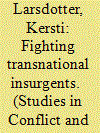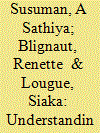|
|
|
Sort Order |
|
|
|
Items / Page
|
|
|
|
|
|
|
| Srl | Item |
| 1 |
ID:
135794


|
|
|
|
|
| Summary/Abstract |
This study aims to explain how adolescents in a rural high school conceptualise school violence. Qualitative data were collected over two two-day periods (24 hours) through child-centred tasks like drawing and the completion of open-ended sentences, informal conversations regarding the given activities, observations documented as visual data (photographs), a research journal, and focus group discussions. In total, four boys and five girls participated in the study. Results of the study indicate that the adolescents (aged 15–17 years) view school violence both as negative, in that it causes harm, and positive, in that it serves as a strategy to ensure order and protection. The adolescents conceptualise violence as interweaving constructs of power, discipline and aggression. Future adolescent-focused interventions regarding violence must include conversations about these nuanced understandings.
|
|
|
|
|
|
|
|
|
|
|
|
|
|
|
|
| 2 |
ID:
135788


|
|
|
|
|
| Summary/Abstract |
The young nation of South Sudan is currently engaged in a review of its Transitional Constitution with the aim of finalizing a Permanent Constitution by 2015. One of the key issues the subject of negotiations is whether the Permanent Constitution should contain power-sharing features and if so, whether those features should be formal or informal. While it is widely accepted that the Permanent Constitution will contain federal elements, this article gives consideration to the way in which formal and informal power-sharing arrangements that are found in federations such as Nigeria, South Africa and Ethiopia, could be employed by South Sudan.
|
|
|
|
|
|
|
|
|
|
|
|
|
|
|
|
| 3 |
ID:
134989


|
|
|
|
|
| Summary/Abstract |
Transnational insurgents are a common feature of contemporary wars, but research on how to address this problem is still scarce. This article examines the South African Defence Force's (SADF) counterinsurgency against Namibian transnational insurgents. It concludes that the South African forces focused a large amount of their efforts outside the borders of Namibia. Highly coercive operations in Angola and Zambia created the space for hearts and minds activities in Namibia, as well as forcing neighboring states to end their support for the insurgents. Although the war in Namibia is somewhat different from contemporary wars, SADF's cross-border strategy gives us some important insights into the regional dynamics of civil wars.
|
|
|
|
|
|
|
|
|
|
|
|
|
|
|
|
| 4 |
ID:
137022


|
|
|
|
|
| Summary/Abstract |
The issue of corporate social responsibility (CSR) of firms in their host community remains an unsettled academic debate. In developing states where multinational corporations (MNCs) are dominant actors, the issue is even more contested. Most importantly, MNCs’ profit motive, their support in their home country and the inability to hold them accountable to their host community/state’s aspirations present a direct clash with their innocent appearance and pretence of CSR. But why do MNCs need to be overloaded with the host community’s problems in the form of CSR when they are paying royalties, taxes, rents and other levies to their host states? Despite the fact that recent research in this field has shown how this correlates with the profit motive of these firms, contestation by state-corporations over public goods is not decided in favour of the bottom billion. This article observes attempts by the South African government to provide HIV/AIDS drugs at an affordable price based on recommendations by the World Trade Organization-Trade-Related Aspects of Intellectual Property Rights (WTO-TRIPS) between 1997 and 2014. By January 2014, MPCs, in their bids to effectively control the production of ARV as against generic licensing accommodated in the TRIPS agreement, started a campaign of calumny against South African government. This was aimed indirectly to influence the Proposed Draft National IP Policy of September 2013 that will make ARV cheaper in the country. The campaign was described by the South African Department of Health as a genocide attempt against South Africans.
|
|
|
|
|
|
|
|
|
|
|
|
|
|
|
|
| 5 |
ID:
136526


|
|
|
|
|
| Summary/Abstract |
India and South Africa both are extremely rich in terms of biodiversity, but are also developing countries where the majority of the population lives in poverty and scarcity. Hence, conservation of biodiversity sometimes comes into conflict with crucial requirements of ecological survival, population pressure and development needs, which led to the sacrifice of priceless biological resources and natural heritage. In order to ensure conservation and management of biodiversity, there is need for strong commitment and cooperation through strategic partnership between India and South Africa having conman purposes, prospects and problems in current situations.
|
|
|
|
|
|
|
|
|
|
|
|
|
|
|
|
| 6 |
ID:
136329


|
|
|
|
|
| Summary/Abstract |
The emergence of well-positioned middle powers is a profound impetus for change within the international arena of structure rearrangement, issues replacement, and values reconstruction. In particular, India, Brazil, Turkey and South Africa are middle powers that rose together during the global FINANCIAL crisis to become a compelling force, each transitioning to active participant rather than follower.1 As a result, Chinese diplomatic personnel are in a unique position to capitalize on their newly transformed political and economic influence.
|
|
|
|
|
|
|
|
|
|
|
|
|
|
|
|
| 7 |
ID:
137011


|
|
|
|
|
| Summary/Abstract |
The emergence of the Brazil, Russia, India, China and South Africa (BRICS) group of states as a new geopolitical power bloc has received substantial coverage in the media. South Africa’s inclusion in the group has been particularly controversial, and media attention tended to focus on the country’s relationship with China against the backdrop of the BRICS alignment. The media industry itself has also been a part of global movements of people and capital. This article seeks to establish how this relationship has been represented in the South African media, and to explore the attitudes of senior journalists and editors towards South Africa’s position within the changing global geopolitical landscape.
|
|
|
|
|
|
|
|
|
|
|
|
|
|
|
|
| 8 |
ID:
135561


|
|
|
|
|
| Summary/Abstract |
The article focuses on the South African Air Force (SAAF) plans and procurement and highlights the South African National Defence Force (SANDF). Topics discussed include terms proposed by the South African Defence Review such as maritime reconnaissance capabilities, pending approval of the Defence Review by the country's parliament, and need of tactical and strategic airlift acknowledged by SAAF.
|
|
|
|
|
|
|
|
|
|
|
|
|
|
|
|
| 9 |
ID:
135351


|
|
|
|
|
| Summary/Abstract |
South Africa has made significant advances in attempting to organise and formalise its space sector with the prime focus of leveraging the benefits of space science and technology for socio-economic growth and sustainable development. A particular instrument in this regard is the National Space Policy, which provides for a set of strategic objectives and guiding principles in terms of how stakeholders, both state and non-state actors, should organise and conduct themselves within the framework of a national space programme. The National Space Policy aims to improve the level of co-ordination and co-operative governance in the space sector that in the past has been fragmented and disorganised, and to further develop a domestic space industrial base. The foundation for a sustainable national space programme hinges critically on the participation of the domestic industry in the national space agenda and thereto the creation of a supportive regulatory environment is necessary. This paper provides insight into the main tenets of South Africa’s National Space Policy with the aim of highlighting the key policy directives.
|
|
|
|
|
|
|
|
|
|
|
|
|
|
|
|
| 10 |
ID:
134241


|
|
|
|
|
| Summary/Abstract |
The problem of disabilities is growing all over the world. Nevertheless, some progress has been made since the year 1981 was proclaimed International Year of Disabled Persons. In 2001 people living with disabilities accounted for 5% of the South African population. Because of their disabilities or the perception society has regarding their potential, this population is mostly economically inactive. This study assesses the relationship between disabilities and the adverse socio-economic impacts. Both descriptive and logistics regression models are used to understand the problem by exploring the data of the 2006 South African General Household Survey. The overall people living with disabilities and aged 15–49 years is estimated at 1742 (961 males and 780 females), when exploring people with disabilities findings reveal that the Western Cape Province’s disabled are mostly affected by physical disabilities (40%). People living with disabilities are 3.5 times (p < 0.01) more likely to suffer from illness/injuries (flu, tuberculosis (TB) and severe cough, diarrhea, blood pressure and HIV/AIDS) than others. Therefore, the study aims to contribute to a better condition of people living with disabilities in South Africa by informing and possibly changing the public perception about them.
|
|
|
|
|
|
|
|
|
|
|
|
|
|
|
|
|
|
|
|
|